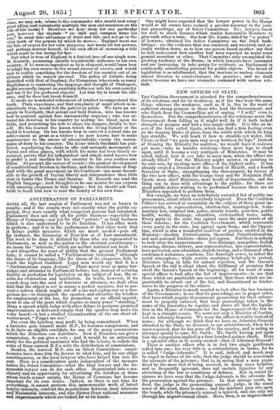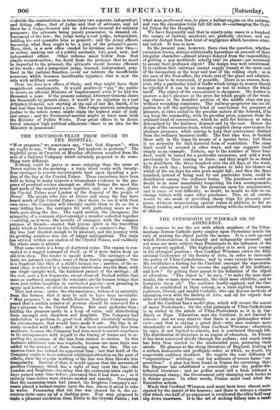NEW OFFICES OF STATE. - •
THE Coalition Government is attacked for the comprehensiveness of its relations, and for its weakness, as if the two were the same thing ; whereas the weakness,' such as it is; 'lies in the want of sufficient strong purpose in those who lead the Government, and who flinch from the Cromwellian act of saying, " I Will," even to themselves. But the comprehensiveness of the relations saves the Government from falling; as it 'might well do if it both lacked strength of purpose and had a less ample stride. It is like an in- sect of the tribe called tipula, which tan find a firm footing even on the dancing blades of grass, from the width -with which its long legs straddle. We will tea& it how to straddle yet wider, like Cxsar, so that "we puny men may creep between its legs." Instead of blaming the Ministry for coalition, we would have it coalesce yet more—take in broader relations—have More legs to stand upon, until it became a very centipede of Ministries. It may be asked, indeed, how it can take in more men, when the offices are already filled ? But the 'Ministry might answer, in -pointing to its own acts, by creating more offices of the highest order. It has already created a President of the Board 'of Health, and a fourth Secretary of State; strengthening the Government, by favour of the two nevi offices, with Sir George Grey and Sir Benjamin Hall. Create more chief Ministers, more heads of departments, and the thing can be done with advantage to the public; for there are great public duties waiting to be performed because there are no Ministers appointed to perform them.
, For example, we have an indefinitely extended list of public im- provements, abmit which everybody is agreed. Even the Coalition Cabinet has arrived at unanimity on the subject of these great im- provements, in representation, election-law, Marriage-law, testa- mentary law, criminal law, police, County boards, poor-law, public health, works, drainage, education, ecclesiastiCal taxes, oaths. Every party in the state has agreed upon the main points of all , these reforms; for the Coalition Government, Which represents every party in the state, has agreed upon them ; and the Opposi- tion, which is also a wonderful coalition of parties omitted in the Ministry—obsolete Protectionists, theoretical Constitutionalists', and anti-national Irishists—dares sot oppose. But there is nobody to look after the improvements. Non-drainage, nonlolice, fooliah swearing, disease, bribery, non-representation, mis-representation, laws perverted, non-education, church-taxing, and a thousand other condemned nuisances, continue, like Ranelagh sewer, to infect the sooial atmosphere ; while society continues helplessly to protest. Ministers bring in bills for annual rejection, and the Queen's , speech at the end is silent about the fulfilment of promises that swell the Queen's Speech at the beginning; all for want of some special officer to look after the list of improvements—to see that those which are practicable are executed, that those which are im- practicable be struck out of the list, and discontinued as hinder- ances to the progress of the others.
Again, a Minister is much wanted to look after the law business of the Government; to see that its proceedings are in proper order, that laws which require Government prosecution for their enforce- , ment be properly enforced, that local proceedings taken in the name of the Executive be regular, and above all that the legisla- tion in the House of Commons for the improvement of the law be kept in a straight course. We want not only a Minister of Justice, but an Attorney-General. We want the officer in reality instead of name ; for although we think that we have an Attorney-Generil attached to the State we discover, to our astonishment, when he is
most required, that he has gone off to the country, and is acting as attorney-special to some Mr. Smith; Mr. Smith having put upon him the compulsion implied in a four-hundred-guinea check. Here is a splendid office to be newly created—that of Attorney-General! There is another officer who is in fact two, single gentlemen rolled into one ; his very title is a contradiction in terms, for he is called "Judge-Advocate." It is said, indeed, and much may be urged in favour of the rule, that the judge should be sometimes the advocate of the prisoner ; that is, in seeing that a man preju- diced by the mere fact of being accused, in manycases helpless, and as frequently ignorant, does net sustain injustice by any stretching of the law or scantiness of defence. But in recent in- stances we have seen that the Judge-Advocate is the advocate for the prosecution against the prisoner. In that strange court, in- deed, the, judge is the prosecuting counsel; judge, in the usual sense of the word, there is none ; and the ignorant jury sits upon the bench, while the prisoner's counsel is ignored, .and can only act throughhis unprofessional client. Here, then, is an improvement
ti-divide the contradietion in terms into two separate, independent, and fitting offices, that of judge and that of advocate, and let there be a Judge-General and an Advocate-General for military purposes; the advocate being purely prosecutor, to demand en- forcement of the law; the judge being a real judge, independent, holding his seat qnamdiu bane se pewit ; and the Army officers becoming, what they ought to be, a jury of the prisoner's peers. Here, then, is a mew -office created by-dividing one into two,— or rather, making -out of a pitiful anomaly, two good, new, and independent officer. Other -reforms .must follow from that simple reconstruction; for, freed from the pretence that he must be impartial to the prisoner, the advbcate would become efficient at his work ; and a competent judge, learned, independent, prac- tised in the judicial function could not tolerate the insufferable nonsense, which- becomes insilfferable injustice, that is now the rule with military courts.
Here are four new offices of State; and they might have their magnificent emolpments. It would positively "pay" the public to secure an efficient Minister of Improvement even if he had ten thousand a year. If the present nominal Attorney-General clears his thousands by patents alone, it would be an injustice to a real Attorney-General, not starting at the call of any Mr. Smith, if he had less than ten thousand a year. The Judge-martial, introducing justice to the whole Army, might claim the highest scale of judi- cial salary ; and the Prosecutor-martial ,might at least rank with the Minister of Public Works. Four great offices to be distri- buted amongst high political adherents-L-there is an idea for the Ministry in possession!



























 Previous page
Previous page